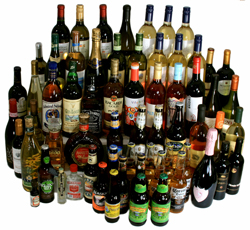Minors can easily purchase alcohol online as a result of poor age verification by Internet alcohol vendors and shipping companies such as FedEx and UPS, according to a new study from University of North Carolina at Chapel Hill researchers.

The study, published in the May issue of the Archives of Pediatric and Adolescent Medicine, found that 45 out of 100 orders attempted by underage buyers were successful, even though they provided their real underage driver license when asked. Only 28 percent of orders placed by minors were rejected because of age verification.
Minors can easily purchase alcohol online as a result of poor age verification by Internet alcohol vendors and shipping companies such as FedEx and UPS, according to a new study from University of North Carolina at Chapel Hill researchers.
The study, published in the May issue of the Archives of Pediatric and Adolescent Medicine, found that 45 out of 100 orders attempted by underage buyers were successful, even though they provided their real underage driver license when asked. Only 28 percent of orders placed by minors were rejected because of age verification.
“With just a few clicks on their computer or smartphone, kids can order alcohol delivered to their home.” said Rebecca Williams, Ph.D., research associate at UNC’s Center for Health Promotion and Disease Prevention and lead author of the study. “We were amazed at how easy it was for minors to buy alcohol online. Using their real ID and a prepaid Visa card, they could place an order for alcohol in just a few minutes and often have it delivered to their door in a matter of days without anyone ever trying to verify their age.”
This study, funded by the Robert Wood Johnson Foundation Substance Abuse Policy Research Program, is the first peer-reviewed study to determine if minors can successfully purchase alcohol online and to examine age verification procedures for online alcohol sales. A 2005 U.S. Supreme Court decision allowed wineries to ship to out-of-state consumers. In the ruling, the court said that states showed little evidence that youth access to alcohol online was a problem.
The 225 Internet alcohol vendors included in the 2007 U.S. Economic Census had annual sales exceeding $2.4 billion. By 2009, the UNC study identified more than 5,000 Internet alcohol vendors.
For the new study, eight underage participants attempted to purchase alcohol online from 100 popular vendors using prepaid Visa debit cards and providing their real identification when asked. There was little use of age verification at the point of order, and less than half of vendors asked that FedEx and UPS verify their customers’ age at delivery, the researchers said. Of the 47 orders that arrived labeled as requiring age verification at delivery, only 34 percent were properly rejected by UPS or FedEx delivery staff after verifying the age of the recipient. Thirty-six percent were left at the door, and 30 percent were handed to the underage buyer after examining their underage ID or taking their word that they were 21.
“The fact that there are literally thousands of online outlets selling alcohol, and that purchase attempts by underage persons are successful almost half of the time tells us how insufficient the protections are for our youth,” said Dr. David Jernigan, director of Center on Alcohol Marketing and Youth at the Johns Hopkins Bloomberg School of Public Health, who wrote a commentary about the study for the journal.
Williams and Kurt Ribisl, Ph.D, professor in the department of health behavior at the UNC Gillings School of Global Public Health, have led several studies about the sale of cigarettes online to minors, and their research has helped inform six federal laws and agreements and 34 state laws restricting online tobacco sales. Ribisl and Williams’ research with Internet cigarette vendors showed similar results to the alcohol study, with as many as 92 percent of Internet cigarette vendors selling to underage buyers in a 2003 study.
“Years of research on Internet tobacco sales supplied the evidence needed to pass state and federal laws restricting these sales, mandating age verification and restricting payment and delivery options,” said Williams. “These changes have made it more difficult for online tobacco vendors to reach underage buyers. This study on Internet alcohol vendors will help provide the scientific basis for new regulatory efforts to address Internet alcohol sales and keep alcohol out of the hands of minors.”
